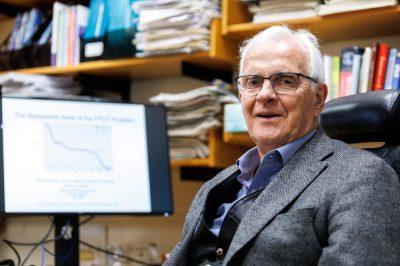David K. Campbell, professor of physics, electrical and mechanical engineering, material science and current director of Graduate Studies at Boston University, has made his name known within the scientific community. He recently won the prestigious SigmaPhi award and attended the SigmaPhi Conference in Chania, Greece, which is a great addition to his already extensive accumulation of accomplishments.
He was awarded the prize for “clarifying the mechanism by which microscopically reversible, non-integrable dynamical systems either approach statistical equilibrium or remain trapped in non-equilibrium metastable states.”
The SigmaPhi prize is given by a subgroup of the European Physical Society to honor outstanding achievements in statistical physics. The award ceremony usually takes place every three years, but due to the COVID-19 pandemic, the 2020 and 2023 SigmaPhi awards were both given this past summer.

Campbell, an expert in nonlinear dynamics and complex systems, was one of three physicists awarded the 2020 SigmaPhi Prize at the conference. He shared the stage with other distinguished scientists awarded the 2023 SigmaPhi prizes, such as J. Michael Kosterlitz who won the Nobel Prize in physics in 2016.
Leading up to this award, Campbell’s career can be viewed as an odyssey of sorts. As he transitioned from education to academia and research, Campbell developed a peripatetic career.
Campbell worked as a fellow at the University of Illinois Urbana-Champaign from 1970 to 1972, a member of the Institute for Advanced Study until 1974, and for 17 years he worked at Los Alamos National Laboratory in New Mexico where he became the first Oppenheimer fellow. This fellowship was named after J. Robert Oppenheimer, who can now be referred to as the “father of the atomic bomb.”
When Campbell worked at the Institute for Advanced Studies, he worked on and solved a major nonlinear problem related to solitary waves, called solitons.
“Most people, when they hear nonlinear dynamics, they think of chaos and disorder, but solitons are sort of the opposite of that,” said Campbell. “It’s like Yin and Yang.”
During his time at Los Alamos, Campbell and other staff members founded the Center for Nonlinear Studies. He consequently developed an interest in nonlinear problems over the course of his career.
A recurring topic in Campbell’s work was the Fermi-Pasta-Ulam-Tsingou problem, which was studied at Los Alamos by eminent scientists, Enrico Fermi, John Pasta, Stanislaw Ulam and Mary Tsingou, of whom the problem was evidently named after.
Campbell won the SigmaPhi prize for his work on the problem.
“The microscopic laws of classical mechanics, Newton’s Laws, are reversible in time. If you see a film of a frictionless pendulum, you can play it forwards or backwards and you can’t tell the difference. But the macroscopic laws of statistical mechanics are irreversible: If you film the result of pouring a glass of water on the table, you know that if you look at it run backwards, you could never see that motion where the water spontaneously goes back into the glass. So that is irreversible,” Campbell said.
Pouring water out onto a table seems irreversible in time, however, Campell uses a pendulum as an example of the opposite motion. In reference to the pendulum, he said, “If you’re going forward in time, you turn it around and go backward in time, and you can’t tell the difference.”
“Because our microscopic laws of physics basically say everything should look the same forward and backward in time, it’s only when you have many collections of particles interacting, that time emerges and you can treat them probabilistically,” said Pankaj Mehta, a professor of physics at BU.
Mehta explained that Campbell “pioneered” many influential techniques that investigated ideas connected to different systems and their behavior.
“[Campbell] was asking somewhat technical questions and running lots of technical computer simulations, but they have very large implications for our understanding of the physical world,” Mehta said.
Campbell called his current status “the sunset stage,” in his career, yet his progressive impact on and connections fostered through the scientific community are nonetheless evident today.
“This prize is a well deserved recognition of David’s pioneering contributions and impact to statistical physics. Apart from his science, David has been a visionary and inspiring leader,” Andrei Ruckenstein, former vice president and associate provost for research and professor of physics, wrote in an email. “I’ve been privileged to work with David over the past 16 years in many roles but most of all I appreciate his friendship, humanism and generosity of spirit.”





















































































































